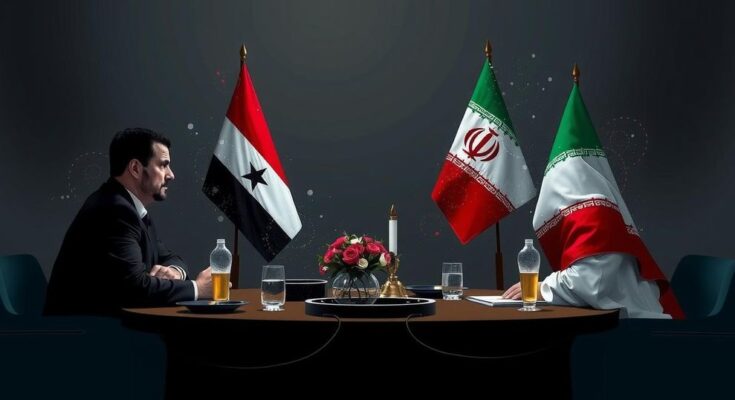The Syrian regime, led by Bashar al-Assad, is seeking support from Iraq, Iran, and the UAE following significant territorial losses, particularly the recent loss of Aleppo to opposition forces. As the regime continues to face threats from various factions in the region, it aims to establish stronger alliances to regain stability and maintain its sovereignty.
The Syrian regime, led by President Bashar al-Assad, is actively seeking assistance from regional allies amid significant territorial losses to opposition forces in northern Syria. Following the recent capture of Aleppo by opposition groups, the regime faces further threats to other vital cities, such as Hama. Currently, the regime maintains control over western Syria, while eastern territories are held by the US-backed Syrian Democratic Forces (SDF) and northern regions are under Turkish influence, with Idlib governed by Hayat Tahrir al-Sham (HTS), a key opposition faction.
In recent days, Assad has reached out to prominent allies, including Russia, Iran, Iraq, and the United Arab Emirates (UAE). Notably, during his visit to Russia, the HTS launched an offensive against Aleppo, prompting a call from Assad to Iraqi Prime Minister Mohammed Shia’ Al Sudani to discuss collaborative efforts in countering terrorism. Both leaders reaffirmed their commitment to supporting Syria’s sovereignty and territorial integrity, collaborating against terrorist threats.
Assad also communicated with Sheikh Mohammed bin Zayed Al Nahyan of the UAE, where he emphasized Syria’s determination to protect its stability and territorial sovereignty. Sheikh Mohammed reinforced the UAE’s solidarity with Syria in combating terrorism and expressed support for efforts leading to a peaceful resolution of the ongoing crisis.
The outreach to Iraq and the UAE underscores the regime’s strategy to reconnect with Gulf states and solidify its standing in the region following years of isolation. Historically, countries like Egypt have initiated dialogue with Assad post-2011 when the Syrian civil war rendered him a pariah. However, the recent losses in Aleppo illustrate that the regime’s position remains precarious, necessitating alliances with Iraq, Gulf nations, and traditional allies like Iran and Russia to bolster its defense against continuing threats from opposition groups.
The Syrian civil war, which erupted in 2011, has severely diminished the Assad regime’s influence and control over the country. Initially viewed as a regional pariah, President Assad’s administration is now seeking to regain support from neighboring countries to stabilize its governance and territorial claims amid rising opposition challenges. With key areas lost to various factions, the regime has initiated a diplomatic re-engagement with former allies, recognizing that the chaos of the civil conflict may pose a more significant threat than the regime itself. The shifting dynamics highlight the importance of Iraq and the UAE as pivotal partners in Syria’s struggle for stability and sovereignty.
In summary, the Syrian regime’s attempts to foster relationships with regional powers like Iraq and the UAE illustrate a strategic pivot to regain support in the face of debilitating military setbacks. Following the loss of Aleppo, Assad’s outreach underscores the urgency for alliances that not only bolster the regime’s military position but also challenge the legitimacy of its opposition. Thus, the Syrian government is increasingly reliant on collaborative efforts with its allies to assert control and stability in a fragmented landscape.
Original Source: www.jpost.com




